|
Books Should Be Free Loyal Books Free Public Domain Audiobooks & eBook Downloads |
|
|
Books Should Be Free Loyal Books Free Public Domain Audiobooks & eBook Downloads |
|
War Stories |
|---|
|
Book type:
Sort by:
View by:
|
By: Edward Phillips Oppenheim (1866-1946) | |
|---|---|
 Havoc
Havoc
Havoc occurs when European countries are discussing covert alliances. The story revolves around the creation of a secret alliance between Germany, Russia, and Austria. The English hope to split Russia away by holding the Czar to his previous public commitments, but they need proof of what was done to create the pressure. All the pressures that lead to WWI are there, but the intrigues and secret treaties create an interesting background to the twists and turns of the plot. | |
 Double Traitor
Double Traitor
The setting is the years prior to the outbreak of World War I. It is a time when Germany is outwardly preparing for war but Britain continues to believe it is invincible and that no one would challenge her. A vast German spy network flourishes in England, often in plain view. The main character is Francis Norgate, an aspiring British diplomat who falls in disfavor with his superiors for defending a woman while stationed in Berlin. The resulting scandal causes Norgate to be recalled. On the way home, he meets a German gentleman, Selingman, who claims to be a crockery salesman... | |
 Vanished Messenger
Vanished Messenger
A conference of European nations is being held in the Hague. England has not been invited to attend. Some think war is about to break out. Mr. John P. Dunster, an American, is traveling to the Hague with an important document that may prevent the outbreak of war when he mysteriously disappears after a train wreck in England. Richard Hamel is asked by the British government to attempt to solve the mystery of Dunster’s disappearance and prevent the outbreak of war in Europe. | |
By: Ulysses S. Grant (1822-1885) | |
|---|---|
 Personal Memoirs of U. S. Grant
Personal Memoirs of U. S. Grant
"In preparing these volumes for the public, I have entered upon the task with the sincere desire to avoid doing injustice to any one, whether on the National or Confederate side, other than the unavoidable injustice of not making mention often where special mention is due. There must be many errors of omission in this work, because the subject is too large to be treated of in two volumes in such way as to do justice to all the officers and men engaged. There were thousands of instances, during the rebellion, of individual, company, regimental and brigade deeds of heroism which deserve special mention and are not here alluded to... | |
By: William John Locke (1863-1930) | |
|---|---|
 The Red Planet
The Red Planet
Set during WWI in England, The Red Planet is a rich tale about the life in a little English town from the point of view of Major Duncan Meredyth, a disabled veteran of the Boer Wars. As he struggles to keep his life and the lives of those he cares for in harmony, he must also shelter a dark secret regarding one of the village's favorite sons.The Red Planet was the third bestselling novel in the United States for 1917. | |
By: John Dos Passos (1896-1970) | |
|---|---|
 Three Soldiers
Three Soldiers
Three Soldiers, the second novel by John Dos Passos, follows the experiences of several young Americans thrown into the confusion and brutality of World War I.Written when the author was just twenty-three, it was key to the development of a realistic depiction of war in American literature, and earned Dos Passos, later named by Jean-Paul Sartre "the greatest living writer of our time", important early attention.Critic H L Menken said of it: "no war story can be written in the United States without challenging comparison with it--and no story that is less meticulously true will stand up to it... | |
By: Joseph Lievesley Beeston | |
|---|---|
 Five Months at Anzac
Five Months at Anzac
A Narrative of Personal Experiences of the Officer Commanding the 4th Field Ambulance, Australian Imperial Force from his leaving Australia December 1914 till his evacuation due to illness after 5 months at Gallipoli. Read to remember those who were there. (Introduction by Annise) | |
By: Susan Glaspell (1876-1948) | |
|---|---|
 Visioning , A Novel
Visioning , A Novel
"The Visioning, Susan Glaspell's second novel, tells about Katie Jones, a young woman who lives in the comfortable world she knows with a charming circle of friends. Her brother is an army officer, and her uncle lives in Washington. The world she knows is the world they let her see. Until Anne comes into the picture. Katie saves Anne from killing herself. Katie invents a story about Anne, a story which suits Katie's world, but what would she do, and feel, when she discovers the truth? The story focuses around Katie's eye opening experiences and her search for place and meaning in the new world she slowly discovers... | |
By: Mary Chesnut | |
|---|---|
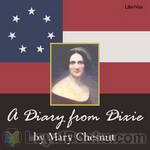 A Diary from Dixie
A Diary from Dixie
Mary Boykin Miller Chesnut, a well-educated South Carolina woman who was the wife of a Confederate general, kept extensive journals during the Civil War. Mrs. Chesnut moved in elite circles of Southern society and had a keen interest in politics. Her diary is both an important historic document and, due to her sharp wit and often irreverent attitude, a fascinating window into Southern society of the time. This recording is of the first published edition of the diary, compiled from Mrs. Chesnut's revisions of her original journals. | |
By: Joseph Alexander Altsheler (1862-1919) | |
|---|---|
 The Guns of Shiloh
The Guns of Shiloh
The Northern Army has just be handed a great defeat at Bull Run and is headed back to Washington, DC. How will the North answer this defeat? Follow our hero, Dick Mason, into the Western campaign to find out.This is the second book in the Civil War Series by Joseph A. Altsheler. | |
 The Star of Gettysburg
The Star of Gettysburg
The Army of Northern Virginia, still victorious after three hard years of fighting, capitalize on their victories at Fredericksburg and Chancellorsville, and a young Harry Kenton, is an eyewitness to the Confederate invasion of the north, culminating in the epic three-day struggle at Gettysburg, Pennsylvania, where Robert E. Lee puts into place a strategy that will end the war, or shatter his army. (Introduction by Robert Fletcher) | |
 Guns of Bull Run
Guns of Bull Run
The first volume in the Civil War series, following the adventures of Harry Kenton, who leaves his home in Kentucky. He travels through dangerous territory to South Carolina on a secret mission on the eve of the Civil War. (From Chapter 4) "They will not fire! They dare not!" cried Shepard in a tense, strained whisper. As the last word left his lips there was a heavy crash. A tongue of fire leaped from one of the batteries, followed by a gush of smoke, and a round shot whistled over the Star of the West... | |
 Sword of Antietam
Sword of Antietam
"The Sword of Antietam" tells a complete story, but it is one in the chain of Civil War romances, begun in "The Guns of Bull Run" and continued through "The Guns of Shiloh" and "The Scouts of Stonewall." The young Northern hero, Dick Mason, and his friends are in the forefront of the tale. | |
 Rock of Chickamauga
Rock of Chickamauga
"The Rock of Chickamauga," presenting a critical phase of the great struggle in the west, is the sixth volume in the series, dealing with the Civil War, of which its predecessors have been "The Guns of Bull Run," "The Guns of Shiloh," "The Scouts of Stonewall," "The Sword of Antietam" and "The Star of Gettysburg." Dick Mason who fights on the Northern side, is the hero of this romance, and his friends reappear also. | |
 Shades of the Wilderness
Shades of the Wilderness
"The Shades of the Wilderness" is the seventh book of the Civil War Series by Joseph A. Altsheler. Picking up where "The Star of Gettysburg" left off, this story continues the Civil War experiences of Harry Kenton and his friends in the Southern army, from the retreat after Gettygurg, to Richmond, and then through the battles of the Wilderness and Spottsylvania, to Robert E. Lee's heroic stand during the siege of Petersburg. Other books in the Civil War series are: "The Guns of Bull Run," "The Guns of Shiloh," "The Scouts of Stonewall," "The Sword of Antietam", "The Star of Gettysburg","The Rock of Chickamauga", and "The Tree of Appomattox." | |
By: Lady Dorothy (Stanley) Tennant (1855-1926) | |
|---|---|
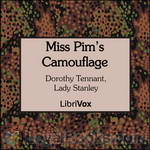 Miss Pim's Camouflage
Miss Pim's Camouflage
Mid-WWI, staid Englishwoman Miss Perdita Pim suffers a sunstroke gardening & gains the power of invisibility. She becomes a super-secret agent, going behind German lines, sometimes visible, sometimes not, witnessing atrocities & gleaning valuable war information. | |
By: Edward Streeter (1891-1976) | |
|---|---|
 Dere Mable
Dere Mable
Bill is in training camp, preparing to go off to World War I. This book is a collection of love letters written to his sweetheart, Mable. The letters are humorous, mis-spelled, and have many stories of life in an army camp – all from Bill’s unique perspective. | |
By: Oliver Wendell Holmes, Sr. (1809-1894) | |
|---|---|
 My Hunt After 'The Captain'
My Hunt After 'The Captain'
Holmes describes his frantic search through Civil War torn landscapes for his wounded son, the future Supreme Court Justice. Originally published in The Atlantic Magazine, 1862. Holmes, Sr. (1809 -1894) was an American physician, poet, professor, lecturer, and author. He was regarded by his peers as one of the best writers of the 19th century. His most famous prose works are the "Breakfast Table" series, which began with The Autocrat of the Breakfast Table (1858). He is also recognized as an important medical reformer. | |
By: Elinore Pruitt Stewart (1878-1933) | |
|---|---|
 Letters of a Woman Homesteader
Letters of a Woman Homesteader
The writer of the following letters is a young woman who lost her husband in a railroad accident and went to Denver to seek support for herself and her two-year-old daughter, Jerrine. Turning her hand to the nearest work, she went out by the day as house-cleaner and laundress. Later, seeking to better herself, she accepted employment as a housekeeper for a well-to-do Scotch cattle-man, Mr. Stewart, who had taken up a quarter-section in Wyoming. The letters, written through several years to a former employer in Denver, tell the story of her new life in the new country... | |
 Letters on an Elk Hunt
Letters on an Elk Hunt
This is a sequel to Letters of a Woman Homesteader in which Elinore Rupert (Pruitt) Stewart describes her arrival and early years on a Burntfork Wyoming ranch in 1909-1913. The letters are written to her elderly friend, Mrs. Coney, in Denver. In the present collection of letters, Elinore describes a lively excursion on horseback and wagon into the Wyoming wilderness during July-October 1914. Her traveling companions are her husband “Mr. Stewart,” their three oldest children, and kind-hearted, opinionated neighbor Mrs... | |
By: Ward Muir (1878-1927) | |
|---|---|
 Observations of an Orderly
Observations of an Orderly
Ward Muir brings us into the heart of an English war hospital, describing scenes of cleanliness, triumph, order and sadness. Through the eyes of the orderly we get to see the processes that kept the wards running, and relive some tales from within the hospital walls. | |
By: John Maynard Keynes (1883-1946) | |
|---|---|
 Economic Consequences of the Peace
Economic Consequences of the Peace
The Economic Consequences of the Peace (1919) was a best seller throughout the world, published by John Maynard Keynes. Keynes attended the Versailles Conference as a delegate of the British Treasury and argued for a much more generous peace with Germany. The book was critical in establishing a general worldwide opinion that the Versailles Treaty was a brutal and unfair peace towards Germany. It helped to consolidate American public opinion against the treaty and involvement in the League of Nations... | |
By: Lucy Fitch Perkins | |
|---|---|
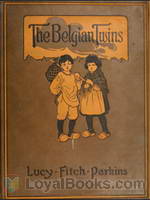 The Belgian Twins
The Belgian Twins
This story is based upon the experiences of two Belgian refugees in World War I. When their parents are marched of by Germans, Jan and Marie are left alone. Now they, along with their dog, have to find their parents! | |
By: Charles Clark Munn (1848-1917) | |
|---|---|
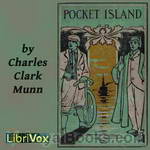 Pocket Island
Pocket Island
Along the coast of Maine are littered thousands of small islands. One such, named 'Pocket Island' by the locals was so called because of a pocket formed twice daily by the waning of the tides. The coast of Maine holds many secrets and legends, and Pocket Island was no exception. Subtitled "A Story of Country Life in New England", this story holds such varied and fascinating glimpses into the lives of a few individuals, and is not limited to merely a story of ghosts, of war, of barn dances, friendship, tales of rum-runners, smugglers, and seafarers... | |
By: Mary Grant Bruce (1878-1958) | |
|---|---|
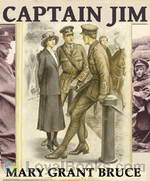 Captain Jim
Captain Jim
This book is about Norah Linton, her brother Jim, her father David and Jim's chum Wally from Australia. They all move to England during WWI because Jim and Wally want to fight in the war.When a Irish friend of the family dies, Norah inherits a big house in Surrey: Homewood. To keep up the Irishman's memory they want to use the house to help the war effort. They turn it into a home for "Tired People"--soldiers recovering from injuries, or soldiers on leave that have no family to go home to, can come here to have a good time and enjoy the country-side, so that they can go back to their regiments fully rested and restored... | |
By: Eddie Rickenbacker (1890-1973) | |
|---|---|
 Fighting the Flying Circus
Fighting the Flying Circus
This is the WWI memoirs of Medal of Honor winner, Capt Eddie Rickenbacker. He fought in and eventually became commander of the 94th "Hat-in-the-Ring" Squadron, which ended the war with the highest number of air victories of any American squadron. The circus mentioned in the title refers to the German squadron commanded by the famous Red Baron, Manfred von Richthofen. (Introduction by Brett W. Downey) | |
By: Elizabeth Inchbald (1753-1821) | |
|---|---|
 A Simple Story
A Simple Story
The story could really have been simple: Miss Milner, who is admired for her beauty and charm, could have been a socialite, marry a respectable and good looking man and be happy in the standards of her time. But if it was so, why would there be a book? Miss Milner, beautiful and charming as she is, announces her wish to marry her guardian, a catholic priest. But women in the 18th century do not declare their wishes or speak about their passions, and- after all- he is a catholic priest… And if he finds a way to marry her, is this her road to happiness? | |
By: George-Günther Freiherr von Forstner (1882-1940) | |
|---|---|
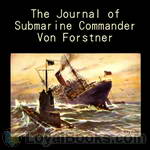 The Journal of Submarine Commander Von Forstner
The Journal of Submarine Commander Von Forstner
The Journal of Submarine Commander Von Forstner is a graphic account of WWI submarine warfare. Forstner was the commander of German U-boat U-28. His journal, first published 1916, gives a gritty picture of daily life inside a submarine and details several torpedo attacks on Allied shipping. The 1917 translation of Forstner’s journal into English was unquestionably intended to bolster the Allied war effort. In the foreword, the translator states: “Nothing at the present day has aroused such fear as this invisible enemy, nor has anything outraged the civilized world like the tragedies caused by the German submarines... | |
By: Bertrand Sinclair (1881-1972) | |
|---|---|
 The Hidden Places
The Hidden Places
Hollister, returning home from the war physically scarred but otherwise healthy and intact, finds life difficult among society, and so chooses to roam about a bit seeking a future for himself. He eventually leads himself to a remote area in British Columbia, which begins the tale of the next phase of his life; a life which becomes far richer in totality than he would have imagined in his old unwelcoming haunts. A life among the hidden places. | |
By: Gaius Julius Caesar | |
|---|---|
 Commentaries on the Gallic War
Commentaries on the Gallic War
Commentarii de Bello Gallico (English: Commentaries on the Gallic War) is Julius Caesar's firsthand account of the Gallic Wars, written as a third-person narrative. In it Caesar describes the battles and intrigues that took place in the nine years he spent fighting local armies in Gaul that opposed Roman domination.The work has been a mainstay in the teaching of Latin to schoolchildren, its simple, direct prose lending itself to that purpose. It begins with the frequently quoted phrase "Gallia est omnis divisa in partes tres", sometimes quoted as "Omnia Gallia in tres partes divisa est", meaning "All Gaul is divided into three parts". | |
By: Sarah Morgan Dawson (1842-1909) | |
|---|---|
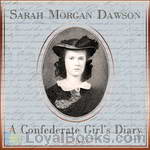 A Confederate Girl's Diary
A Confederate Girl's Diary
Sarah Morgan Dawson was a young woman of 20 living in Baton Rouge, Louisiana, when she began this diary. The American Civil War was raging. Though at first the conflict seemed far away, it would eventually be brought home to her in very personal terms. Her family's loyalties were divided. Sarah's father, though he disapproved of secession, declared for the South when Louisiana left the Union. Her eldest brother, who became the family patriarch when his father died in 1861, was for the Union, though he refused to take up arms against his fellow Southerners... | |
By: Romain Rolland (1866-1944) | |
|---|---|
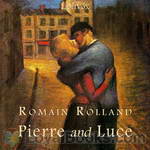 Pierre and Luce
Pierre and Luce
Pierre and Luce were an unlikely young pair who found themselves in the chaos of Paris during the war; Pierre, the shy, recently conscripted pacifist, and Luce, the free spirited artist in training, and both confused about the things going on around them. Why were these war birds flying overhead? Why these warning sirens, and occasional bombs exploding in the distance? Why did the government leaders, who didn't even know one another, hate and destroy so much? Why did these two delicate young adults find each other now? This story takes place between January 30 and Good Friday, May 29, 1918. (Introduction by Roger Melin) | |